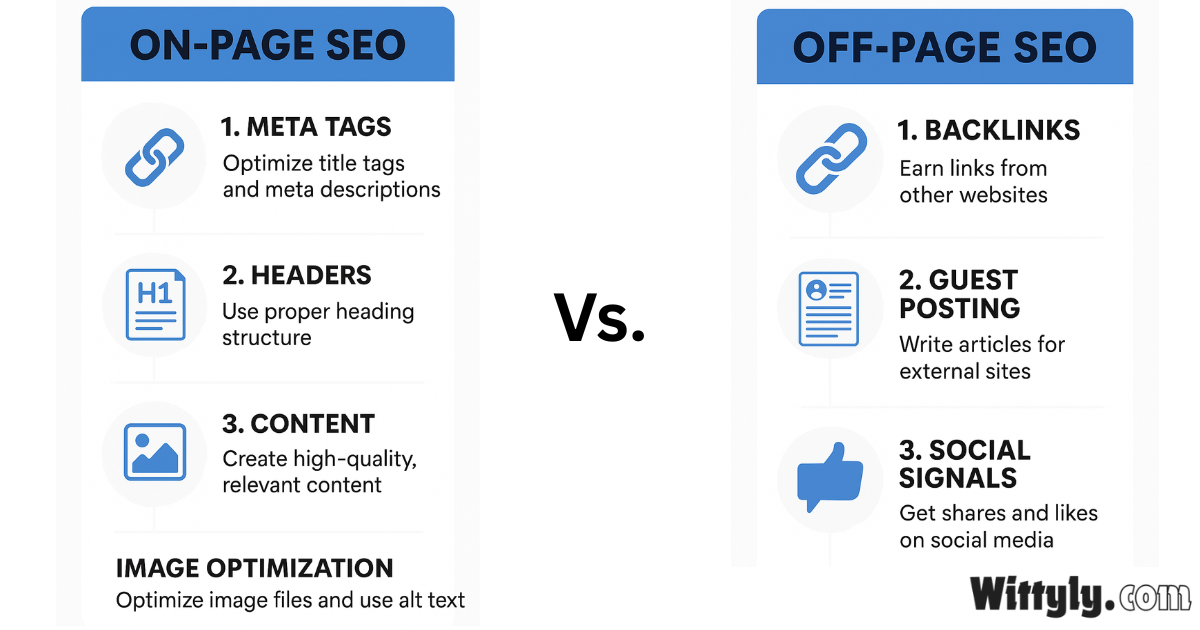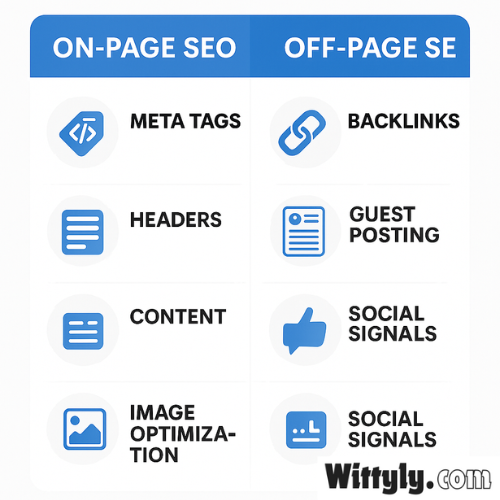Key Takeaways
- Difference on how to built powerful online persence with On-Page SEO vs Off-Page SEO
- On-page SEO deals with everything on your website — content, structure, speed, and meta tags.
- Off-page SEO focuses on how others perceive your website — through backlinks, guest posts, and social proof.
- Both are essential for SEO success.
- Regularly audit and adjust both strategies to stay ahead of the competition.
Do you want your website to rank higher on Google? The key is SEO but do you know how to Improve SEO in 2025? First you need to know the difference of On-Page SEO vs Off-Page SEO. These are two powerful tools that help your website get noticed. On-page SEO is everything you can control on your site — like your words, images, and structure. Off-page SEO is what happens outside your site — like getting backlinks and social shares. In this blog, you’ll learn how both work and why you need them to grow your traffic and make strong online presence.
Table of Contents
- Key Takeaways
- What is On-Page SEO?
- Why Invest in On-Page SEO Services?
- Summary of On-Page SEO Elements
- What is Off-Page SEO?
- How to Balance Both for Best Results
- Why Hire an SEO Expert?
- FAQs
- Final Words
What is On-Page SEO?
On-page SEO refers to the strategies and techniques used within your website to improve its ranking in search engine results. It’s everything you can control directly on your website — from the text and images to the technical structure.
Whether you’re working with an on-page SEO expert or using on-page SEO services, knowing what goes into it is essential. Let’s explore the key elements.
1. Meta Tags (Title and Description)
Meta tags are snippets of text that describe a page’s content. They don’t appear on the page itself but in the page’s HTML code.
- Title tag: This is the clickable headline that appears on search engine result pages (SERPs). It should include your primary keyword and stay within 60 characters.
- Meta description: This appears under your title tag in search results and should be around 150–160 characters. A well-written meta description improves click-through rates.
Both are crucial for communicating to search engines what your page is about and encouraging users to click.
Example: A good title tag for this article would be: “On-Page SEO vs. Off-Page SEO: Understand the Key Differences”
2. Headers (H1, H2, H3…)
Headers help organize your content and make it easier for both users and search engines to read.
- Use H1 for your main page title (only once).
- Use H2 and H3 to structure sub-topics logically.
Search engines scan your headers to understand the context of your page. Including keywords naturally in these headers is key to on-page SEO success.
3. High-Quality, Keyword-Optimized Content
Content is still king. Your website content should be:
- Relevant to your audience
- Easy to read and free of fluff
- Strategically optimized with keywords (but avoid keyword stuffing)
Use your main keyword and related terms naturally within the first 100 words. Sprinkle them throughout headings, bullet points, and body text.
Working with an on-page SEO expert can help you structure your content effectively and make it search engine-friendly without sacrificing quality.
4. Image Optimization
Images make your content engaging — but they can also hurt your SEO if not optimized properly. Here’s how to do it right:
- Compress images to reduce loading times (use formats like WebP or compressed JPEG).
- Add alt text that describes the image using relevant keywords.
- Use descriptive file names (e.g., on-page-seo-guide.jpg instead of IMG0001.jpg).
Optimized images improve page speed and accessibility, both of which contribute to better rankings.
5. URL Structure
Search engines prefer clean, readable URLs. Make sure your URLs:
- Contain relevant keywords
- Avoid unnecessary words or numbers
- Use hyphens to separate words (e.g., yoursite.com/on-page-seo-services)
Good URL structure is a simple but often overlooked on-page SEO practice.
6. Internal Linking
Linking to other relevant pages on your site helps:
- Guide visitors to more content
- Improve site structure and user experience
- Spread link equity across your pages
Use descriptive anchor text like “on-page SEO services” instead of generic terms like “click here.”
7. Mobile-Friendliness and Page Speed
A responsive design ensures your site looks and works great on all devices. Google considers mobile-friendliness a ranking factor. Fast-loading pages also reduce bounce rates and increase user satisfaction.
Tools like Google PageSpeed Insights and Mobile-Friendly Test can help you improve these areas.
8. Schema Markup (Advanced On-Page SEO)
Schema markup adds additional context to your pages, helping search engines understand them better.
- Add Review schema for product pages
- Use FAQ schema for blog posts
- Implement Organization schema on your homepage
These enhancements can lead to rich snippets, increasing your visibility in search results.
Why Invest in On-Page SEO Services?
If you’re not confident handling this yourself, hiring on-page SEO services is a smart move. A professional on-page SEO expert can analyze your site, identify gaps, and implement effective strategies to boost your rankings and traffic.
Summary of On-Page SEO Elements
| Element | Purpose |
| Meta Tags | Helps search engines understand page content |
| Headers | Organizes content for readability and SEO |
| Optimized Content | Engages users and includes relevant keywords |
| Images | Increases engagement and improves loading speed |
| URL Structure | Improves readability and SEO clarity |
| Internal Linking | Guides users and distributes SEO value across your site |
| Mobile/Page Speed | Enhances user experience and satisfies Google’s ranking criteria |
| Schema Markup | Enables rich snippets and better search engine understanding |
What is Off-Page SEO?
While on-page SEO focuses on what’s happening within your website, off-page SEO looks at how your site is perceived and promoted outside of it. Think of it as your website’s reputation — and just like in real life, a strong reputation can open doors.
If you’ve ever searched for off-page SEO services or wondered what an off-page SEO service includes, you’re about to find out.
Let’s explore the key components of off-page SEO and how they directly influence your search engine rankings.
1. Backlinks: The Backbone of Off-Page SEO
What Are Backlinks?
Backlinks are links from other websites pointing to your site. They act like votes of confidence in your content. The more quality backlinks you have, the more trustworthy your website appears to search engines.
Not all backlinks are created equal. A link from Forbes is much more powerful than one from a random blog.
Why Backlinks Matter:
· Improve your domain authority
· Help search engines discover your pages faster
· Drive referral traffic from external websites
· Signal that your content is valuable and trustworthy
Types of Backlinks:
· Natural Links – Earned organically when someone links to your content because it’s helpful
· Manual Links – Acquired through outreach or collaborations (like guest posting)
· Self-Created Links – Added in profiles, forums, or directories (should be used carefully)
A professional off-page SEO service focuses heavily on building high-quality, relevant, and authoritative backlinks to give your site a real boost.
2. Guest Posting: Authority and Exposure in One
What Is Guest Posting?
Guest posting is when you write and publish content on another website, typically including a backlink to your own. It’s a win-win: the host site gets free content, and you get a quality backlink and exposure to a new audience.
Benefits of Guest Posting:
· Get high-authority backlinks
· Reach targeted audiences
· Position yourself as an industry expert
· Build relationships with influencers in your niche
If you’re investing in off-page SEO services, make sure guest posting is part of the strategy. It’s one of the safest and most effective ways to build authority.
Pro Tip: Avoid spammy guest posting on irrelevant or low-quality sites. Google can tell the difference.
3. Social Signals: The Power of Sharing
What Are Social Signals?
Social signals are actions people take on social media platforms — likes, shares, comments, and mentions — that reference your content.
While Google has stated that social signals are not a direct ranking factor, they can indirectly influence your SEO by:
· Increasing brand visibility
· Driving more traffic to your site
· Generating engagement that attracts natural backlinks
How to Use Social Media for SEO:
· Share every new blog post across your social platforms
· Use engaging visuals and hashtags to increase interaction
· Encourage user-generated content and mentions
· Collaborate with influencers to expand your reach
Social signals support your off-page SEO strategy by helping your content reach more eyes and earn more credibility.
Recap: On-Page vs Off-Page SEO
Here’s a quick breakdown of how on-page SEO vs. off-page SEO compare:
| Feature | On-Page SEO | Off-Page SEO |
| Location | On your website | Outside your website |
| Examples | Meta tags, content, image alt text | Backlinks, guest posts, social shares |
| Focus | Site structure, keywords, user experience | Reputation, authority, external promotion |
| Control | Fully within your control | Depends on external websites and platforms |
| Tools Used | CMS, plugins, page builders | Outreach tools, backlink checkers, social media |
How to Balance Both for Best Results
To succeed in SEO, you need both sides of the equation.
- Start with strong on-page SEO: Make sure your website is optimized from top to bottom. Fix titles, improve speed, and optimize your content and images.
- Then build your off-page SEO: Reach out for guest posts, focus on quality backlinks, and grow your social presence.
It’s not On-Page SEO vs Off-Page SEO.” It’s on-page SEO AND off-page SEO working together.

Why Hire an SEO Expert?
Many businesses today use on-page SEO services and off-page SEO services together to stay ahead. An experienced SEO expert knows how to:
· Audit your site
· Identify gaps
· Build an effective, well-balanced SEO plan
· Monitor results and adjust strategies as needed
If you want to dominate search rankings, don’t rely on one strategy alone. SEO is a long game, and balance is key.
FAQs
1. What’s the main difference between on-page and off-page SEO?
On-page SEO is about optimizing your website’s internal elements, while off-page SEO is about improving your site’s authority and visibility through external factors like backlinks.
2. Are backlinks still important in 2025?
Yes! Backlinks remain one of the top ranking factors in Google’s algorithm. Quality always beats quantity.
3. Can I do on-page SEO without off-page SEO?
You can start with on-page SEO, but to rank high in competitive niches, you need off-page SEO too.
4. Is guest posting considered white-hat SEO?
Yes, as long as it’s done on relevant, high-quality websites and provides genuine value to readers.
5. How long does it take to see results from off-page SEO?
Usually 3 to 6 months, depending on your niche, competition, and how consistent your strategy is.
Final Words
Understanding the difference between on-page vs off-page SEO is essential to building a powerful online presence. Want to climb the search rankings? Start optimizing your site today — and don’t forget the world outside your website matters just as much.
Wittyly is a content-driven platform powered by a team of SEO experts, writers, and digital marketers who are passionate about helping businesses grow online. From actionable marketing guides to expertly crafted branding strategies, Wittyly delivers high-quality, well-researched content you can trust. Every article is professionally written and thoroughly proofread to ensure accuracy, clarity, and value for readers across industries.
Email: Contact@wittyly.com



